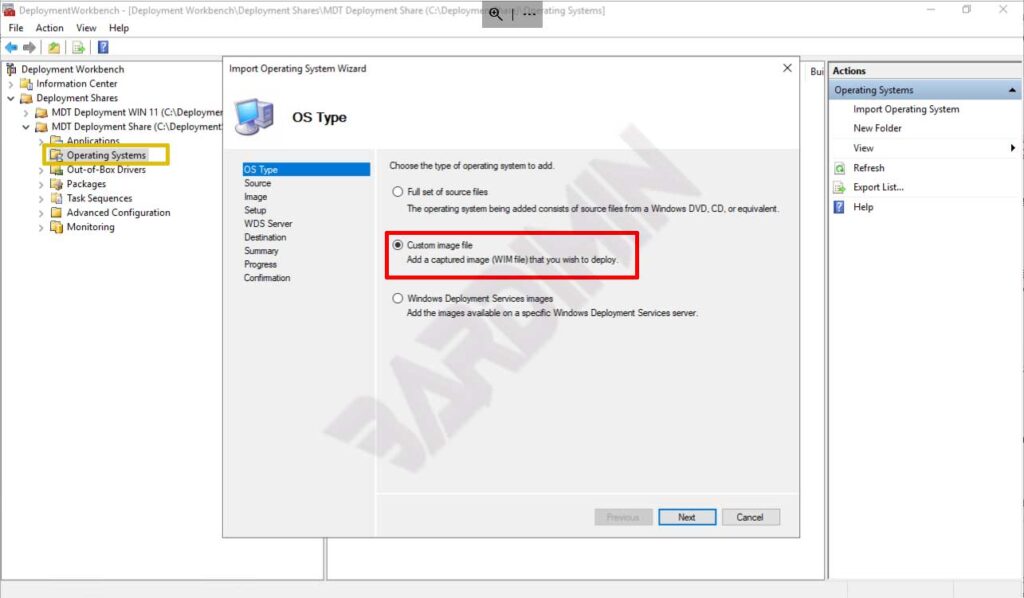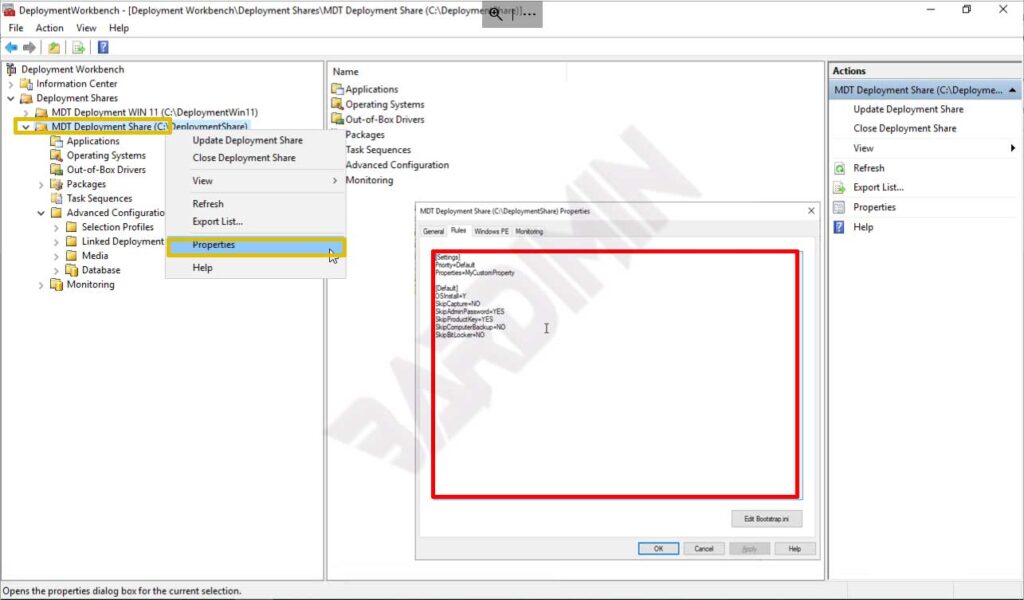Konfiguration des Microsoft Deployment Toolkit (MDT)
- Öffnen Sie das „Deployment Workbench“ und navigieren Sie zum „Deployment Share“, das Sie zuvor erstellt haben.
- Wählen Sie „Operating System“, dann klicken Sie mit der rechten Maustaste und wählen Sie „Import Operating System“. Wählen Sie im Fenster „Import Operating System Wizard“ den Eintrag „Custom image file“. Importieren Sie nun die Datei „install.wim“, die Sie zuvor erstellt haben.

- In der Option „Applications“ können Sie Anwendungen hinzufügen, die automatisch installiert werden sollen. Sie können Anwendungen wie Office, Google Chrome, Acrobat Reader, usw. hinzufügen. Dann müssen Sie auch das Skript „Silent Install“ der Anwendung hinzufügen.

- Als nächstes folgt in diesem Abschnitt „Task Sequences“ die Abfolge der Aufgaben, die zur Implementierung Ihrer Windows-Produktionsreferenz verwendet werden.
Regel-Automatisierung
Im Microsoft Deployment Toolkit (MDT) können Sie die Regeln festlegen, die während des Installationsprozesses verwendet werden sollen. Wenn Sie die richtigen Regeln erstellen, können Sie alle Prozesse automatisieren.

Um eine Regel zu erstellen, klicken Sie mit der rechten Maustaste auf den von Ihnen erstellten „Deployment Share“ und wählen „Properties“. Wählen Sie dann die Registerkarte „Rule“ und klicken Sie auf die Schaltfläche „Anwenden“, um sie anzuwenden. Eines der folgenden Beispiele für Regeln, die von Sam Schoeller erstellt wurden, können Sie verwenden.
MDT customsettings.ini for one touch image deployment
by Sam Schoeller <https://github.com/samuelschoe>
[Settings]
Priority=Default
Properties=MyCustomProperty
[Default]
'sets the default install type
OSInstall=Y
DeploymentType=NEWCOMPUTER
'skips the capture wizard pane.
SkipCapture=YES
DoCapture=YES
ComputerBackupLocation=NETWORK
BackupShare=\\server\DeploymentShare$
BackupDir=Captures
BackupFile=%TaskSequenceID%.wim
'skips setting local admin pass, product key and deployment type wizard panes
SkipAdminPassword=YES
AdminPassword=xxxxxx
SkipDeploymentType=YES
SkipProductKey=YES
'skips the domain join pane, and sets OU and account details to autojoin to the xxx computer OU. Uses limited domain join only delegated account
SkipDomainMembership=YES
MachineObjectOU=OU=xxxxx,OU=xxxxxxxxxx,DC=xxxx,DC=com
JoinDomain=xxxxxxx.com
DomainAdmin=xxxxxxxx
DomainAdminDomain=xxxxxxxxxxxxxx
DomainAdminPassword=xxxxxxxxxxxxxxxxxxxxx
'skips collect user data pane as this is for clean installs
SkipUserData=YES
'auto selects task xxx, the golden image in the xxx server. set to NO or comment out to bring this pane up to select a different task
SkipTaskSequence=YES
TaskSequenceID=xxx
'enables a default value with location and PC serial for xxx, but also enables computer name pane for user input
SkipComputerName=NO
OSDComputerName=XXXNEW-%SerialNumber%
'skips the package display pane
SkipPackageDisplay=YES
'Sets the language and keyboard panes
SkipLocaleSelection=YES
UILanguage=en-us
UserLocale=en-us
KeyboardLocale=en-us
'sets the timezone to pacific.
SkipTimeZone=YES
TimeZoneName=Pacific Standard Time
TimeZone=004
'sets our homepage. It was defined in task, but this is a better, global place to define it, as it does change occasionally.
Home_page=http://xxxxxxxx.com
'skips the application wizard. May want to enable
SkipApplications=NO
'skips apps on upgrade actions. This is redundant, as we are doing new installs, but I left it in to not forget it exists.
SkipAppsOnUpgrade=YES
'installs default themepack
Applications001={xxxxxxxxxxxxxxxxxxxxxxx}
'xxxxxxxxxxxxxxxxxxxx
Applications002={xxxxxxxxxxxxxxxxxxxxxxx}
'installs xxxxxxxxxxxxxxxx
Applications003={xxxxxxxxxxxxxxxxxxxxxxx}
'installs xxxxxxxxxxxxxxxxxxxx
Applications004={xxxxxxxxxxxxxxxxxxxxxxx}
'remove Libaries folder from Desktop
Applications005={xxxxxxxxxxxxxxxxxxxxxxx}
'points at our WSUS server to pull updates
WSUSServer=https://update.xxxxxx.com:8531
'skips the preamble and post amble summary. Will still display post summary in red if there are errors.
SkipSummary=YES
SkipFinalSummary=YES
'sets default screen resolution so low, windows is forced to auto adjust to the correct resolution.
BitsPerPel=32
VRefresh=60
XResolution=1
YResolution=1
'Sets a share location for the logs file
SLShareDynamicLogging=\\server\deploymentshare$\DeploymentLogs
'This is used by the MDT monitoring service for something or other
EventService=http://server:9800
Sie können auch den Standard-Anmeldebenutzer und das Kennwort zu „Edit Botstrap.ini“ hinzufügen. Wenn Sie diese Regel hinzufügen, fragt MDT nicht mehr nach dem Benutzer und dem Kennwort und verwendet diese Anmeldedaten für den Zugriff.
[Settings] Priority=Default [Default] DeployRoot=\\MDT\DeploymentShare$ UserDomain=myDomain.local UserID=myID UserPassword=myPassword SkipBDDWelcome=YES


